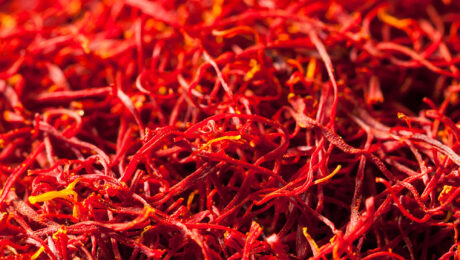SAFFRON RECIPES
Saffron is used in dishes, juices, drinks, teas, soups, Ice creams, cookies, and so on. We have enlisted here some, however, saffron usage is not limited only to them:
- Steamed Saffron Rice with Tahdig (Chelo ba Tahdig)
- Shellfish Paella
- Risotto alla Milanese
- Baked Saffron Yogurt Rice with Chicken (Tahcheen-e Morgh)
- Paella recipe
- Scampi risotto
- Saffron rice
- Saffron fish soup
- Saffron risotto
- Spaghetti
- Saffron Orange Turkey
- Raisin rice
- Herbed Rice with Fish Tahdig (Sabzi Polo ba Tahdig-e Mahi)
- Indian Fried Dough with Saffron Syrup (Jalebi)
- Marseille-Style Fish Stew with Aioli
- Saffron Orange Ice Cream
- Artichokes with Olives
- Bouillabaisse (Seafood Stew)
- Chicken Biriyani
- Chicken Stew with Fennel & Saffron
- Chinese-Style Paella
- Cornish Hens with Olives
- Ricotta Pancakes in Cardamom Syrup (Malpura)
- Sweet Yogurt with Saffron and Pistachios (Shrikhand)
- Sopa de Habas (Fava Bean Soup)
- Kefta Tagine (Lamb Meatball and Egg Tagine)
- Chicken Biriyani
- Creamy Saffron Yogurt
- Saffron Yogurt Chicken Kabab
- Saffron Cookies
- Artichokes Braised with Saffron, Black Olives and Almonds
- Roast Chicken with Saffron and Lemon
- Chicken Tagine with Apricots, Figs, and Olives (Tagine Djaj Bzitoun)
- Fusilli with Cauliflower Sauce (Fusilli con i Broccoli Arriminati)
- Golden Saffron Cake
- Italian Fish Stew
- Lamb in Saffron & Cardamom Cream
- Persian Lentil Rice with Lavash Tahdig (Adas Polo)
- Seafood Pasta
- Beef Broth with Liver Dumplings and Saffron
- Lamb Stew With Chestnuts And Pomegranates
- Lancaster Chicken Corn Soup
- Lemon Chicken with Jerusalem Artichokes
- Oyster Club’s Lobster
- Khan Plov (Chicken Pilaf in a Lavash Crust)
- Stuffed Meatballs and Chestnuts in Saffron Broth (Küfta Bozbash)
- Lemon Saffron Bread
- Mushroom and Leeks with Saffron Rice
- Potato Saffron Omelet
- Honey-Braised Lamb Shanks (Mrouzia)
- Saffron and Cider
- Paella with Chorizo, Chicken, and Shrimp (Paella Mixta)
- Linguine with Sardines, Raisins, and Pine Nuts (Pasta con le Sarde)
- Saffron Crawfish Risotto
- Saffron Potato Onion Soup
- Seafood Paella
- Almond-Cardamom Pakhlava
- Sicilian Seafood Stew with Almonds and Couscous
- Moroccan Pigeon Pie (B’stilla)
- Kashmiri Saffron Tea
- Saffron Rice with Cashews and Raisins
- Scallops with Orange Saffron Sauce (Coquille St. Jacques)
- Stewed Artichokes with Olives and Moroccan Spices
- Tomato Saffron Chicken
- Published in Uses of Saffron
Saffron Boosts the Immune System against COVID-19
COVID-19 has changed how we function; it has changed the norms of society, and pretty much our lifestyles as well. COVID-19 is highly impactful on our immune system. People who have a more robust immune system are likely to get less affected and even overcome it faster, as compared to people who have weaker immune system. This has left us looking for products that can boost our immune system. Saffron has a wide range of benefits, and it is to believe that it does boost the immune system.
Antiviral Properties
Any herbs or spices that have antiviral properties will prove to be beneficial in consuming during the COVID-19 days and even after in order to be on safe side. Saffron has antioxidant properties that can help the body in fighting any free radicals in the body, which strengthens the immune system.
Rich Source of Vitamins
Saffron is a rich source of vitamins like vitamin B1, B2, B6, and vitamin C. All these vitamins are crucial for a healthy immune system and in building up a weaker immune system. Besides, carotenoids are also present in Saffron that affects the body’s immune response towards multiple diseases. Evidence suggests that Saffron can stimulate a rapid cellular response that can help the white cells in fighting antibodies.
Building Immune System
After every disease, the immune system takes a significant blow and dips down to its bare minimum. Saffron can help build up the immune system; 100mg of Saffron a day offers an immunomodulatory response [immunomodulation is a regulatory adjustment of the immune system], which can be beneficial against coronavirus.
Protection Against Common Cold
Saffron tea and Saffron milk are effective against cold and fever. It is used in a stimulant tonic to treat cold. You can massage Saffron-infused milk on the forehead for quick cold relief. Many people believe that COVID-19 is very similar to cold, and that is why all that you do to prevent a cold can be done to prevent coronavirus as well.
Anti-Inflammatory Property
Saffron can also relieve any inflammation in the body. Inflammation is one of the major causes of different diseases in humans. This property of Saffron makes it a top choice for people who want to live a healthy life. The plant from which Saffron is extracted has numerous benefits that make Saffron all the more beneficial.
Saffron has no side effects, so even if there is not enough evidence to support the claim that it can fight against coronavirus by boosting your immunity, there is no harm in consuming it. In addition to boosting your immunity, there is proven evidence that it can help with mild depression as well as anxiety in addition to many other healt benefits. Kick start your day need a cup of Saffron tea and soak in its natural benefits.
Sources
https://www.mdlinx.com/article/-antiviral-foods-to-beef-up-your-immunity/2yc1JqtFgKUR4OxXTYkaS0
https://www.webmd.com/vitamins/ai/ingredientmono-844/saffron
- Published in Health Benefits, Uses of Saffron
Saffron in the kitchen
Saffron is widely used in the culinary world because of its rich taste and beautiful color. It can be used as a natural coloring agent that is completely free of harmful chemicals. Saffron contains chemicals like Crocin, Picrocin, and Safranal. These are the three main elements that work together to make Saffron an essential condiment that perfectly blends with a number of herbs and spices and makes her dish delicious. Original Saffron is also very expensive and that is why it is often found tucked away in the corner of the cupboard. It is widely used in Asian, Indian, and Middle Eastern cuisines. Lately, we have seen Saffron being used across America to give natural flavoring to savory and sweet dishes.
In this article, we will see how Saffron is used in different parts of the world and how they infuse Saffron in their dishes.
Saffron Use in the Culinary World
In Afghanistan: Afghanistan is a major producer of the world # 1 Saffron. Saffron is used in a wide variety of dishes in Afghanistan and the Middle Eastern region. Rice-based dishes, sweet dishes, kababs, as well as teas and coffees are enriched with saffron flavor.
In Iran: Iran is the largest producer of Saffron. It is used in several sweet dishes as they also associate happiness and good luck with Saffron.
In India: In India, saffron is used at a wide scale, and since it is also cultivated in the region, it is used abundantly. In Indian cuisine, Saffron is used with regional spices in dishes like biryani, which is a meat and rice dish and is considered a specialty of the region. Multiple desserts are also made, which are infused with Saffron. Saffron milk is also very popular.
In Morocco: Saffron is used in many tajine dishes.
In Europe: Saffron was not very popular in Europe a few years ago, but it seems like it has finally found its calling. It is used in soups and with fish, while sweet dishes and ice creams are also flavored with Saffron.
In Spain: Apart from Afghanistan, Spain is the 2nd place where the best quality of Saffron can be found, and that is why it is used abundantly in dishes like Paella and some fish dishes.
In the United States: Recently, Saffron has started to be cultivated in the United States, specifically in Pennsylvania. United States also imports Saffron from other countries including Afghanistan. Afghan Saffron is getting famous in the States because of its high quality. It is used abundantly to give flavor and color to cakes, noodles, and fish dishes.
Another reason for Saffron being used so widely around the world is because it has many benefits as well. People are also of the opinion that the use of Saffron can help in preventing and combating COVID-19 and the similar viral diseases. The antioxidant and anti-inflammatory properties can work together against COVID-19 and the similar viral diseases.
Sources
https://www.azernews.az/region/80987.html
https://surfiran.com/visit-iran-for-iranian-saffron/#:~:text=Saffron%20and%20its%20magical%20power,Persian%20New%20Year%20(Norouz).
https://saffronhealthsci.com/blogs/general-knowledge/is-crocin-the-active-constituent-of-saffron-crocus-sativus-a-potential-antioxidant-and-anti-inflammation-agent-against-coronavirus-covid-19-a-combination-of-ancient-wisdom-in-natural-healing-with-current-research
Saffron Recipes
We have enlisted a few dishes, however, the saffron usage is not limited only to them:
- Published in Uses of Saffron
How to make saffron teas
Saffron is a very famous spice that is used throughout the globe including North America; it is extracted from the Flowers of Crocus Sativus Linné. It is considered a delicacy, and that is why the original Saffron is extremely expensive. The red stigmas produced by the flower called the threads are removed carefully from the plants, and then they are dried; this forms the Saffron spice. Saffron has a very fragrant taste, and it is also used as a natural coloring agent. In recent times, Saffron tea has become somewhat famous due to Saffron’s enormous benefits. This article will document how Saffron tea can be beneficial and why you should include it in your daily routine.
Benefits of Saffron Tea
- Antidepressant
Saffron is also known as the sunshine spice because it has more lifting properties. Many people think that it is called sunshine spice because of its red and yellow hues, but actually, it is because of its properties. According to research, Saffron can be as effective as fluoxetine, which is a drug that can be used to cure mild depression. There has been significant improvement in the moods of people who consume Saffron tea every day. If you are someone who is not comfortable in taking antidepressants, Saffron tea can be a good alternative.
- Memory Booster
As the property suggests, Saffron is believed to improve memory functions. Saffron tea is a rich source of Crocin and Crocetin, which are both known to improve learning and memory functions. Researchers are confident that Saffron could have a potential in treating brain diseases like Alzheimer’s and Parkinson’s. The research is only in the initial phase so nothing concrete can be said yet.
- Helps with PMS
Premenstrual Syndrome or PMS can be responsible for a variety of uncomfortable conditions, ranging from mood swings to physical discomfort. Saffron tea can be an excellent alternative to medication in relieving women from such symptoms. Saffron tea will relax your nerves and help you to calm down. It is prescribed to take 15 mg of Saffron twice a day to relieve PMS symptoms.
- Helps with Weight Loss
Saffron tea can help you in curbing your appetite by preventing you from unhealthy snacking. Consuming Saffron tea will make you feel full, and as a result, you will abstain from eating at odd times.
These are just a few benefits of Saffron tea; it is no less than a miracle spice and is rightly known as sunshine spice. Make it a habit to consume Saffron tea every morning to give yourself the start you deserve.
How to make Saffron tea, you can visit Eat Beautiful and Ciao Florentina
Sources:
https://www.healthline.com/health/food-nutrition/saffron-tea-benefits
https://www.healthbenefitstimes.com/saffron-tea/
- Published in Uses of Saffron
Saffron’s Health Benefits
Saffron is a spice that comes from a plant named Crocus Sativus and has a very different color and strong fragrance. It is one of the most expensive spices in the world and that is why it is renowned as a Golden Spice. It is mostly cultivated in Middle Eastern countries, Afghanistan, Iran, and parts of Europe like Greece.
Saffron is known as the Father of Medicine as it is rich in antioxidants and is used to make many medicines. Along with its extensive use in the pharmaceutical industry, it is also used in teas, drinks, and as food color, food flavor, perfume ingredient, and a fabric dye.
There are many health benefits of Saffron. Some of the most common ones are:
1. A Powerful Antidepressant
Saffron is very effective in treating mild to moderate depression as it contains mood-boosting properties. Studies show that Saffron can increase dopamine levels in the brain without changing the levels of other brain hormones, such as Serotonin.
2. Provides Antioxidants
Saffron contains antioxidants like Crocin, Picrocrocin, and Safranal, which help to fight against oxidative stress and free radicals in the body. These oxidative stress and free radicals may cause the development of cancer and heart diseases in a person’s body.
3. Reduces Premenstrual Syndrome (PMS)
Saffron helps in relieving the symptoms of premenstrual syndrome. PMS can cause discomfort to a woman in 1-2 weeks before her menstrual cycle begins. Taking Saffron supplements daily throughout 2-3 menstrual cycles have a noteworthy decrease in PMS symptoms.
4. Prevents Cancer
Saffron contains antioxidants like Crocin, which helps to inhibit malignant cells from spreading and becoming cancerous. It does not have any effect on normal cells; in fact, it stimulates their formation and that of immune cells (known as lymphocytes) to help in destroying cancer cells.
5. Boosts Memory
Saffron contains Crocin and Crocetin, which help in improving memory learning and function. Crocin found in Saffron especially is very useful in age-related mental impairment and memory loss treatments. It also helps in treating brain diseases like Parkinson’s and Alzheimer’s.
6. Improves Heart Health
Saffron contains many chemical components that strengthen the blood circulatory system and reduce the risk of heart diseases. It is also effective in lowering blood pressure and cholesterol. Due to its antioxidant properties, Saffron helps to maintain arteries and blood vessels healthy.
7. Acts as an Aphrodisiac
Aphrodisiac foods or supplements are known to improve the libido. People who are taking anti-depressants see it affects their erectile functions but taking saffron can show significant improvement. Consuming 30mg of saffron for 4 weeks will have significant results.
8. Aids Weight Loss
One of the main reasons behind weight gain is excess eating and munching on unhealthy food items. Consuming saffron will suppress the appetite which means that you will be consuming less food. Curbing your appetite and making you feel full is the only reason behind Saffron’s aid in the weight loss process.
9. Helps Improve Eyesight
There is some proof that saffron can also help in improving the eyesight or it at least makes sure to prevent further damage to the eyesight. It can also protect from any radical damage to the eyes.
10. Improves Bone Strength
Calcium is the main element that is responsible for bone strength. There are certain nutrients in saffron that can help in the absorption of calcium in the bones. Consuming saffron with foods that are high in calcium significantly helps with bone strength.
11. Improves Nerve Function
B6 is an essential vitamin required by the brain that helps it to run smoothly and also prevents any serious disorders. Saffron is rich in vitamin B6. Another research shows that saffron can also very successfully mitigate pain symptoms and also makes a person less sensitive to pain.
12. Helps Control Diabetes
Manganese helps in regulating the sugar levels in the body and the presence of manganese in saffron indicates that it can also regulate blood sugar levels. How this works in that when blood sugar levels are controlled, the insulin production is also regulated that keeps diabetes under control.
13. Reduces Acne
Saffron is a very rich source of minerals and vitamins and that is why it is good for the skin. It can also lighten the appearance of the skin by reducing the melanin content in the skin. It also has anti-inflammatory properties that help with acne and acne scars.
14. Boosts Immune System
100mg of saffron daily can help in regulating the body which will help to boost the immune system. It will prove to be beneficial especially fighting the COVID-19.
15. Helps Alleviate Asthma
In some patients, saffron has also helped alleviate asthma. The clinical symptoms in asthma patients have seen to improve significantly.
16. Helps with Insomnia
Sleep deprivation is one problem that is very common these days. Every other person is suffering from insomnia. Saffron is a natural ingredient through which insomnia can be reduced and eliminated. It is a natural sleeping aid.
17. Benefits for Pregnant Women
For pregnant women, little doses of saffron are prescribed as large quantities that prove to be harmful. With the correct amount of consumption, there are a number of benefits that can be reaped from saffron in pregnancy:
- Helps with mood swings
- Manages blood pressure
- Alleviates morning sickness
Helps with digestion - Reduces cramps
This article is a clear indicator that Saffron is a miracle spice that has numerous benefits. You can make it part of your daily life to reap all its benefits.
Risk, Precaution and Dosage
Small quantities of Saffron have no adverse effects on human health. According to research, one can take up to 1.5 gram of Saffron/day, however 30mg consumption of Saffron every day is very safe and enough to gain its health benefits. Consuming more than 5 grams of Saffron can have toxic effects. Pregnant women are discouraged from using high doses of Saffron as it can result in a miscarriage. It is advised to consult your physician before starting any supplement.
Sources
https://www.healthline.com/nutrition/saffron
https://www.medicalnewstoday.com/articles/327017
https://www.webmd.com/vitamins-and-supplements/saffron-uses-and-risks
DISCLAIMER:
FOOD AND DRUG ADMINISTRATION (FDA) DISCLOSURE
The statements made concerning this product have not been evaluated by the Food and Drug Administration (FDA). This product is not intended to diagnose, treat, cure, or prevent any disease.
OUR WEBSITE DISCLAIMER
It is not the purpose nor the intention of this website to provide medical information and suggestions for the diagnoses, prevention and/or treatment of any disease. For any of your medical issues and concerns you should always consult your doctor. Thank You
- Published in Health Benefits




